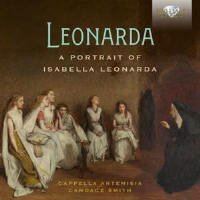Texte paru dans: / Appeared in: |
|
|
Outil de traduction |
|
|
Anna Isabella Leonarda (1620-1704) entered an Ursuline convent in the Piedmontese city of Novara at the age of 16 and rose through the ranks during her long life, not only serving as magistra musicae but eventually becoming mother superior. Sixteen of the prolific composer’s collections published between 1641 and 1700 have survived, and their contents cover all sorts of liturgical and devotional genres of sacred music; she also produced the earliest-known printed collection of instrumental sonatas by a woman (Violin sonatas, Op 13, 1693). Candace Smith’s thoughtfully curated selection of 10 pieces is evidently the tip of the iceberg. Cappella Artemisia’s expert performances feature up to eight female singers, harp and organ continuo, and a pair of obbligato violins played with graceful responsiveness by Victoria Melik and Claudia Combs. At the midway point, these four instruments take the limelight in a lively trio sonata.
Soloistic motets include Salve regina (sung rapturously by Silvia Vajente), O flammae, o aurae beatae (a virtuoso love song to Jesus sung with supplicatory passion by Elena Bertuzzi), and O dulce sonare (a harmonically adventurous trio for three voices in tandem with exquisite violin ritornellos). The duet O anima mea is an ecstatic expression of adoration for Christ on the Cross. The dialogue Quo pergis anima is a miniature oratorio during which a Soul is tempted by the World to renounce Jesus (the bridegroom), but an Angel prevents this catastrophe from happening; all four join together in tightly woven counterpoint to praise how sweet it is to choose the beloved bridegroom. The Christmas motet In caelis gloria in terris pax has florid contemplative solos framed by choral refrains that paraphrase the Angelic promise to the shepherds of peace on earth. Proceedings conclude vibrantly with the full complement of musicians in a broadly sonorous Dixit Dominus. An overdue advocacy for the musical nun praised by a local chronicler as ‘The Muse of Novara’.
|
|




